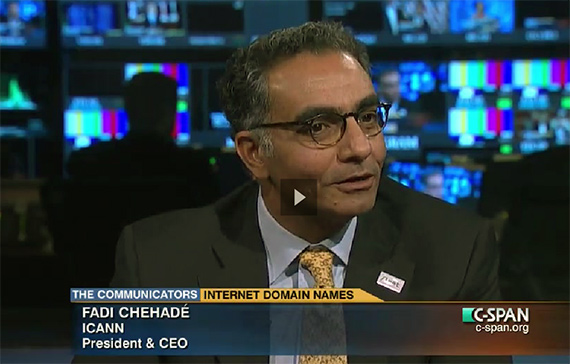Philip S. Corwin is a Founding Principal of Virtualaw LLC, a Washington, DC Law and Public Policy Firm.
He also serves as Of Counsel to the IP-centric law firm of Greenberg & Lieberman, and as Strategic Advisor to the ICANN Sherpa DNS-focused consultancy.

Fadi Chehadé, ICANN CEO on C-SPAN.
The views expressed in this article are solely his own.
“Last weekend C-Span, the public service network that broadcasts proceedings of the U.S. Congress and other U.S. government functions, aired a segment of its series “the Communicators” featuring ICANN CEO Fadi Chehade; C-Span describes the show as “Half-hour conversations with the leaders who shape our digital future”. While the interview is actually just 28 minutes long, and appears to have been recorded on January 28th, it contains some surprising statements that raise some intriguing questions. The intervening NTIA announcement of the intent of the United States to step back from and transfer its IANA functions contract counterparty role by September 2015 makes the answers to those questions even more important — especially given the uncertainty regarding what effect that transition will have on ICANN’s accountability and transparency in the future.
CEO Chehade is rather clearly on the record that ICANN’s relationship with the U.S. (of which the last remaining shred is that U.S. role as IANA counterparty) is no longer sustainable and must be replaced by the “globalization” of ICANN and the IANA functions within a very narrow time frame. What drives this viewpoint are Edward Snowden’s NSA revelations and the purported resulting loss of “trust” in the U.S., even though the identity of the IANA counterparty has no effect on the ability of the NSA or any other intelligence agency to conduct Internet surveillance.”
Some of the comments left at the article’s discussion area, indicate that the transition will lead to the fragmentation of the Internet, instead of its convergence.
For the full article click here.
Copyright © 2025 DomainGang.com · All Rights Reserved.











